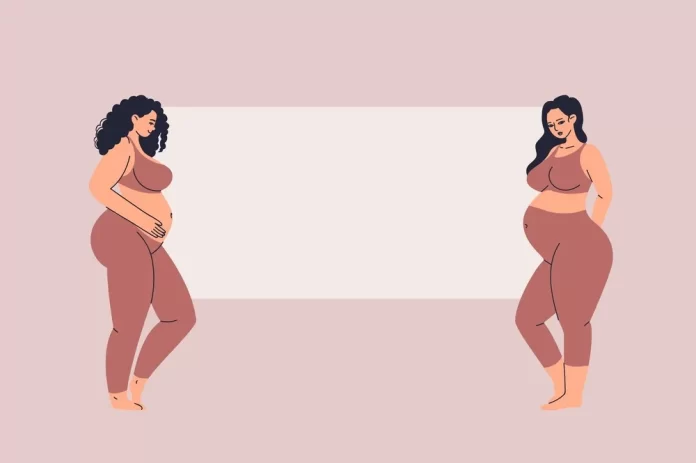
Pregnancy brings women many physical and emotional changes as they prepare to nurture a new life. Their body fat levels may also change depending on how their body reacts to pregnancy and weight gain.
But what happens to existing belly fat when pregnant? Well, the answer is complex.
Some women may lose some of their existing belly fat as their body uses it to fuel the growing baby. Others may gain more belly fat as their body adjusts to the pregnancy.
It’s normal and healthy to gain some weight during pregnancy, but too much can cause problems. Pregnant women should eat well, exercise regularly, and see their doctor often.
Talk about what happens to existing belly fat when pregnant
Studies have found that too much belly fat in the early months of pregnancy can raise the chance of problems like gestational diabetes, high blood pressure, and pre-eclampsia. Pregnant women should check their weight and body fat with their healthcare provider and follow their advice for a healthy pregnancy.
Your growing baby makes your belly fat expand around it. So if you have more weight on your tummy, you may not see the round shape of pregnancy as soon. Your tummy may get more challenging as your belly fat stretches, depending on your weight.

Belly fat and the first trimester
The first trimester of pregnancy is generally considered to be the first 12 weeks of pregnancy. This is calculated from the first day of the last menstrual period rather than from the date of conception because it can take time to determine the exact date.
The body changes a lot in the first trimester of pregnancy to help the baby grow and develop. These changes include more hormones, a bigger uterus, and more blood.
It’s normal to gain some weight in the first trimester, but too much belly fat, significantly, may raise the chance of problems like gestational diabetes, high blood pressure, and pre-eclampsia.
Also, too much belly fat may raise the chance of congenital disabilities and other health issues in the baby.
Belly fat and the second trimester
The second pregnancy trimester is generally considered weeks 13 through 28. During this time, the fetus continues to grow and develop, and the mother’s body undergoes further changes to support the developing fetus.
Week 13 is when the second trimester begins. A pregnant woman will feel more energetic and hungry at this point. It’s normal to gain between 10 and 15 pounds of extra weight in the second trimester. Try to avoid gaining more than 15 pounds in the second trimester because, in the third trimester, you will start to gain ½ a pound every week.
In the second trimester, your belly fat will spread as your uterus grows more extensive and goes past the pelvic area to give you the round shape of a pregnant tummy.

Belly fat and the third trimester
Your tummy should look pregnant when you reach the third trimester (week 27). Even though you will have some belly fat that has moved around, your tummy will have a round pregnancy shape overall, even if you had more weight or were very heavy when you got pregnant.
During the third trimester of pregnancy, the fetus grows and develops rapidly, and the mother’s body undergoes further changes to support the developing fetus. The uterus expands further, and the baby’s movements may become more noticeable as it prepares for delivery.
Weight gain during the third trimester is generally expected and recommended. At this point, you will need to be very careful of your weight so you don’t gain more than one pound weekly. Your baby will get most of its weight in the third trimester, but that doesn’t mean you should also get weight. Gaining a pound every week should cover ½ pound of your baby’s weight during this time.

Monitor BMI and belly fat.
BMI (Body Mass Index) is a way to estimate how much body fat a person has based on their height and weight. It works for both men and women who are adults. But it doesn’t tell you how much belly fat a person has.
How much weight a person can gain safely depends on many things, such as their age, gender, height, weight before pregnancy, and overall health. This is also true when a person is pregnant, and how much weight they should gain is based on their BMI before pregnancy.
The American College of Obstetricians and Gynecologists (ACOG) gives these general guidelines for how much weight to gain when pregnant based on BMI before pregnancy:
| BMI | Expected gain in weight |
| BMI lower than 18.5 | between 28-40 pounds |
| BMI of 18.5 to 24.9 | between 25-35 pounds |
| BMI of 25 to 29.9 | between 15-25 pounds |
| BMI higher than 30 | between 11-20 pounds |
But these guidelines are not for everyone and may not work for some people. Women who have medical problems or had problems with their pregnancies before may need different guidelines for how much weight to gain.
FAQs
Conclusion
During pregnancy, the body undergoes significant changes to support the growth and development of the fetus. Excessive belly fat may increase the risk of complications such as gestational diabetes, high blood pressure, and pre-eclampsia.
While gaining some weight during pregnancy is normal, pregnant women must work with their healthcare provider to monitor their weight and body composition and make necessary changes to support a healthy pregnancy, including engaging in regular physical activity and following a balanced, nutritious diet throughout all trimesters.

